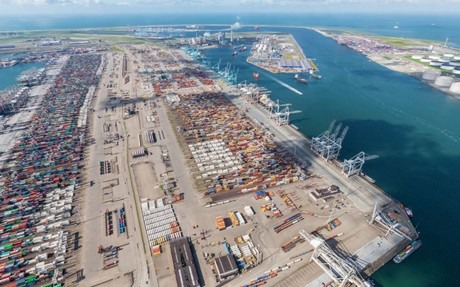Blockchain could boost global trade by $1 Trillion in 10 years and now the Port of Rotterdam is embracing this technology.

“With blockchain, we are already beyond the hype,” explains Martijn Thijsen, Digital Strategy, Transformation and Business Development at the Port of Rotterdam. “It’s early stages and there are challenges to figure out. But, we see multiple uses for blockchain technology and the impact potential is enormous. Rotterdam’s ambition is to be the world’s smartest port and we see this technology as key to supply chain optimization and energy sustainability.”
Stakeholders across the enormously complex logistics supply chain are urgently demanding faster, cheaper and more secure and sustainable flows of goods, services and energy. All this while global trade is becoming more complex and less predictable. Digitalization has delivered some improvements, but there remains a mountain of documentation, time delays and a lack of interconnectivity. Companies still operate with completely different administrative systems in their own little silo, which can be immensely time consuming and expensive. For example, it can take weeks to trace a single product and all its components through the entire supply chain, and to clarify its origin and ownership at every step in the timeline. A single PO number from beginning to end is typed over more than a 100 times in mails, systems and documents.
Rotterdam’s innovative maritime community recognizes that blockchain has the potential to solve such issues and improve the efficiency of supply chain management and port logistics. This open and collaborative eco-system welcomes companies large and small and offers them excellent business opportunities to develop, test and bring blockchain solutions to market.
BlockLab was co-founded by the Port of Rotterdam and the City of Rotterdam. As a Smart Industries Field Lab their role is to put blockchain technology into practice. They are also embedded in the regional innovation ecosystem with the Port Authority and they participate in the Dutch Blockchain Coalition.
Despite massive increases in the volume of international trade over the last 50 years, most of it is still run on documents that go back to the 14th century,” explains Aljosja Beije, Logistics & Technology Lead at BlockLab and co-author of Blockchain and the Supply Chain: Concepts, Strategies and Practical Applications. “We have digitized but, so far, we have not automated. That’s where blockchain will have a big impact.”
“Blockchain is particularly suitable for collaborative co-ordination,” says Aljosja Beije. “It also suits the way we work here in Rotterdam, where we have a history of forming consortiums to co-create workable solutions. This culture, combined with our outstanding port infrastructure and expertise in digital innovation, makes us the go-to place for partners with similar goals.”
For more information:
Frouke Albers
Port of Rotterdam
Tel: +31 (0)6 22 4022 90
www.portofrotterdam.com
